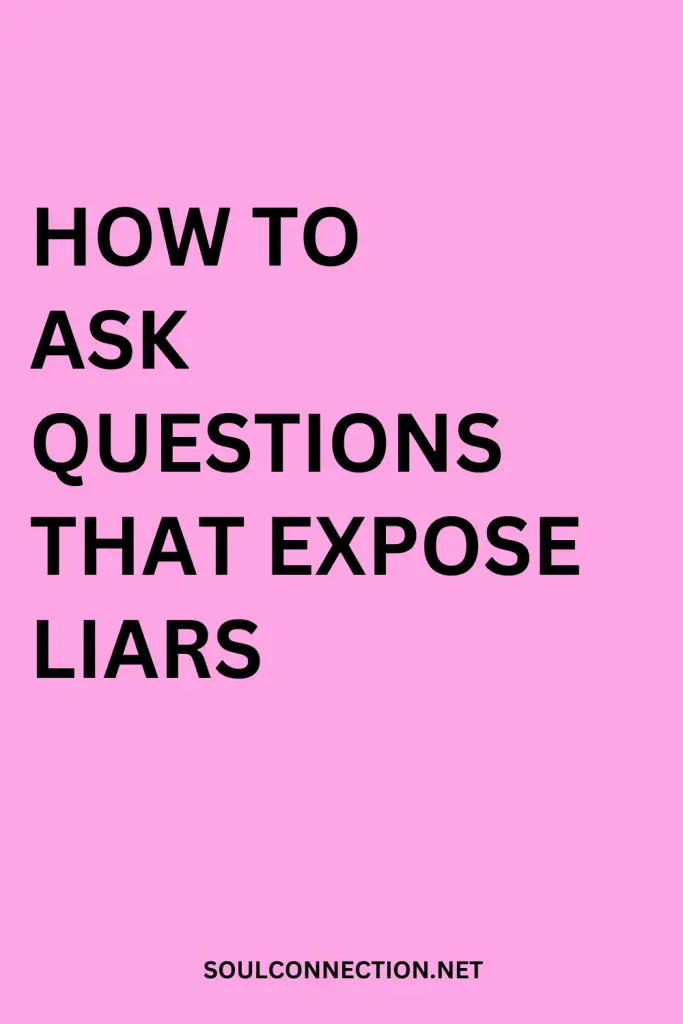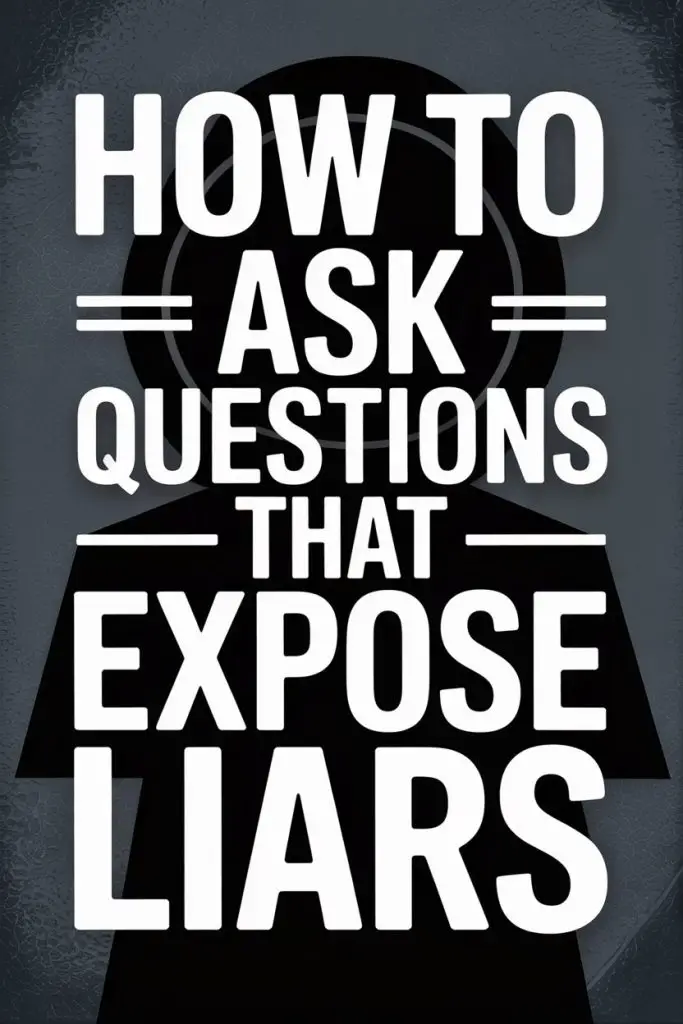Who hasn’t wondered whether someone’s being straight with them—maybe over a missing slice of cake or, more seriously, a late-night text from an “old friend”?
Most of us aren’t living in a police procedural, but everyone wishes they could spot a fib as deftly as TV detectives do. The good news: you don’t need a polygraph or a trench coat to sniff out dishonesty.
The right questions, delivered with the right attitude, can tell you more than any gadget.
Let’s pull up a chair and get wise to the tricks that actually work in everyday conversation.
Don’t Start With the Big Accusation
Charging in guns blazing with “Are you lying to me?” rarely nabs a confession; you’ll more likely get defensiveness, outrage, or a nomination for Most Dramatic Partner of the Year.
Instead, begin with open-ended questions that encourage storytelling. Ask, “What happened?” or “How did it go?” Liars tend to offer either too much detail (compensating for guilt) or oddly little.
The beauty of open-ended questions? You’re allowing them to fill in the blanks, which is where inconsistencies like to hide.
Make It Personal Without Making It Hostile
When people lie, they have to distance themselves from the story. Phrases like “Someone must have…” or “Things got mixed up…” are all about avoiding personal responsibility.
Toss out questions that steer the conversation back to “you.” For example: “Where were you when this happened?” or “How did you feel about that?”
Watch how quick someone tries to wriggle out of the spotlight. Honest people answer directly; liars will start to sound like they’re allergic to the first person.
Ask for the Same Story More Than Once
Memory is a curious thing. Honest folks tend to tell their stories with a few harmless variations; the core remains the same.
But when someone is fabricating, they’ll painstakingly recreate the tale word for word—or contradict themselves altogether.
Sprinkle your questions throughout the conversation. “Remind me, what did you say happened just after you arrived?” Later, “And you said you’d already seen John at that point, right?”
Genuine answers flow, while lies trip on their own shoelaces.
Use Unexpected Details and See What Happens
Tossing in a question about a detail you haven’t discussed before can be pure magic. For example, “What song was playing when you walked in?” or “Who else did you bump into?”
This isn’t about grilling someone, but about watching how naturally—and consistently—they can add color to their story.
A truth-teller will pause, think, and might say, “I’m not sure, actually.”
A liar? They’ll often grab the first thing that comes to mind, or get defensive that you’re “asking so many weird questions.”
Notice Their Reaction to Silence
After you ask a pointed question, don’t fill the silence. Just wait.
People comfortable with the truth may appear a bit puzzled or thoughtful, but they won’t panic. Someone who’s spinning a yarn?
They’ll rush to fill the gap, sometimes with too much information or a half-baked explanation.
Silence is a spotlight for guilt. Let it shine.
Rephrase the Question Later On
Liars keep a mental script. If you circle back later and phrase a question differently—“Remind me, who called first?” instead of “Who did you hear from?”—watch carefully.
Someone telling the truth doesn’t have to keep track of which lie goes where. Inconsistencies will pop up when they’re forced to improvise.
You’re not being sneaky; you’re being thorough.
Watch for the Overly Defensive
It’s one thing to protest your innocence. It’s another to declare, “Why are you always accusing me?” at the faintest hint of curiosity.
Liars often get personal. “I can’t believe you don’t trust me!” or “You’re so paranoid!”
If a reasonable question triggers a dramatic performance, you might be onto something. Stick to your questions, gently but firmly.
Keep an Eye on Their Body Language (But Don’t Rely Solely on It)
Everyone’s seen those lists: “Liars look away,” “Liars fidget.” Truth: body language is not a lie detector. Some people look away when they’re thinking, others when they’re nervous (even if honest).
What you’re looking for is a change. Did your partner go from calm and chatty to twitchy and hesitant when you brought up a specific detail? Did their voice suddenly go up an octave?
These shifts matter more than any textbook “liar pose.”
Throw in a “Why?” or Two
“Why did you do that?” is harder to answer if you’ve made something up. Motivation often gets left out of a liar’s tale.
A genuine answer might be, “I just felt like it,” or “I wanted to make sure I saw them before they left.” A liar may stumble, repeat themselves, or get annoyed that you’re asking.
You’re not trying to play prosecutor—you’re just following the story, as any curious partner would.
Use Empathy to Lower Their Guard
Sharpened claws rarely draw out the truth. A little warmth disarms. Try, “I get that it might have been awkward,” or “That sounds like a tough spot to be in.”
This isn’t about giving someone permission to lie—it’s about letting them know you’re not out for blood, just honesty. You’d be surprised how often a gentle approach gets the real story.
Listen for Emotional Leaks
When fabricating, people struggle to keep their face and tone matching the content of their words. Someone insisting “I was so angry!” without a trace of emotion? Fishy.
Ask, “How did that make you feel?” and listen for a disconnect between words and delivery. The truth leaks out in sighs, eye rolls, and awkward silences.
Clarify and Summarize Without Accusing
Reflect back what you’ve heard: “So just to make sure I’m getting this, you went to meet Anna at seven, then went straight home?”
This invites correction from honest people (“Actually, it was closer to eight!”) but can make liars defensive or scramble to rework their timeline.
You’re not being a lawyer here; you’re just checking your notes.
Test the Details Casually
Slip in questions about small, easy-to-forget details. “What color was the car?” or “Was the restaurant crowded?”
Liars tend to keep their tales vague or stumble when pressed for specifics.
If you get a lot of “I don’t remembers” about things most folks would recall, it’s worth a raised eyebrow.
Watch for Unnecessary Justification
Ever had someone explain things you never asked about? “I was late because I hit every red light, and then my phone died, and plus, I had to stop for petrol…”
Too much justification reeks of a guilty conscience. If every answer arrives on a silver platter, wrapped in excuses, it’s time to trust your gut.
When You Still Don’t Know
Sometimes you’ve asked every question, watched every twitch, and you’re still unsure. Liars can be convincing, and truth-tellers can get flustered.
In these moments, trust your instincts but don’t leap to conclusions. Gather patterns, not just one-off blips.
Even seasoned detectives know that honesty often reveals itself over time.
What To Do When You Catch a Lie
Suppose you’ve got your answer—the story doesn’t add up, and it’s clear as day. Now what?
Resist the urge to gloat. “Aha! Gotcha!” rarely fixes anything. Instead, calmly point out the inconsistencies: “You said you got home at eight, but then mentioned meeting Jacob at nine before going home. I’m confused.”
See what they do with your confusion.
Healthy relationships aren’t built on gotcha moments but on trust rebuilt after honesty—even if it stings.
Truth and Trust Go Hand in Hand
Hunting for lies isn’t anyone’s idea of a fun date night. Still, learning to ask good questions makes your relationships stronger, whether you’re rooting out a tall tale or just getting to know each other better.
Truth is, you don’t need a detective badge. You just need curiosity, kindness, and a little patience—plus a very good memory for those wild inconsistencies.
May your conversations be honest, your questions sharp, and your cake slices exactly where you left them.


